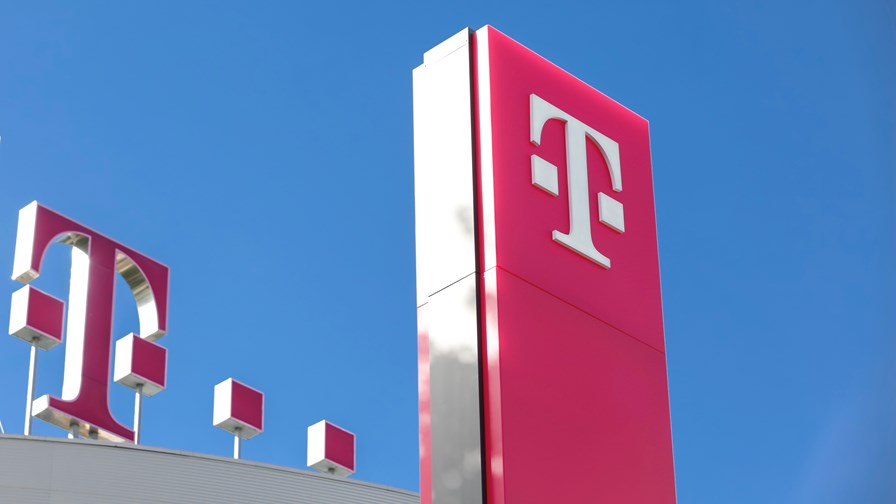
Deutsche Telekom logo (picture courtesy of Deutsche Telekom)
- Deutsche Telekom is getting stuck into quantum comms
- AT&T has turned to Cisco for a new SD-WAN service
- Synaptics, Broadcom and Arm are in the thick of the IoT chip M&A action
Deutsche Telekom’s emerging technology ambitions AT&T’s latest addition to the SD-WAN market and a flurry of IoT chip M&A action are at the front of a lengthy news queue.
- Deutsche Telekom is participating in a research project, the OPENQKD consortium, that is focused on quantum communications technologies that can ensure the security of communications networking transmissions, including 5G traffic. “The aim is to protect the management of communication networks and data transmission over them from possible attacks,” notes the German giant in this announcement.
- Still with Deutsche Telekom: The German operator is laying 870 km of new fiber as part of a contract to build and operate a network for German air navigation service provider DFS Deutsche Flugsicherung; and it is coming under political pressure over its ongoing supplier relationship with Huawei, reports Politico.
- AT&T has launched a new SD-WAN service using technology from Cisco that includes integrated security features such as an application-aware enterprise firewall, intrusion prevention, URL filtering and advanced malware protection.
- Synaptics, a developer of “human interface hardware and software” (such as touch pads and fingerprint recognition technology for smartphones), is to acquire Broadcom’s wireless IoT chip business for $250 million in a bid to bolster its position in the consumer IoT market. Synaptics will acquire certain rights to Broadcom’s existing Wi-Fi, Bluetooth and GPS/GNSS products and business in the IoT market as well as future roadmap devices designed in advanced process nodes.
- Meanwhile, chip tech giant Arm is offloading its IoT-focused units to “entities” owned and operated by its parent company SoftBank to enable it to “focus on its core semiconductor IP business.”
- Nokia’s share price has taken a battering in the past two days following rumours that it could lose some 5G business at Verizon, with Samsung as its potential replacement, reports Reuters. Nokia’s share price has dropped by about 9% to €3.65 since late Tuesday.
- Swiss operator Sunrise has deployed the IoT Connect platform from Polish software firm Comarch to support the expansion of its IoT services.
- Orange Business Services (OBS) has landed an IoT deal with construction firm McConnell Dowell following a collaborative process that led to OBS creating “ a flexible, scalable IoT platform to collect, report and visualize real-time information over a private IoT network, focusing on digitizing manual and paper-centric processes and removing manual tasks from the construction site.”
- Verizon has completed a proof-of-concept trial with Ericsson using Integrated Access Backhaul technology to deploy the operator’s 5G Ultra Wideband service without the need for a fiber connection to the cell site. As Verizon notes in this announcement, Integrated Access Backhaul uses mmWave spectrum to send data traffic back into the wide area network.
- The value of the Italian telecoms services market dropped by 4.4% to €29.8 billion in 2019, according to the most recent report from regulator AGCOM, with the mobile services market taking the biggest hit, dropping by 7.3% to be worth €13.67 billion, while the fixed services market declined in value by 1.7% to €16.17 billion. Iliad’s entry into the Italian mobile market in 2018 with its cut-price tariffs will explain at least some of the steep decline in mobile revenues.
- Amdocs says it has seen an uptick in interest from CSPs for “solutions with mobility experience analytics,” and has been working with its partner Continual, which develops analytics for connected cars and other mobility applications, to deliver the relevant technology to operators such as Vodafone Ireland. For more details, see this announcement.
- Cloud native startup RtBrick has added two new APIs to its software stack that will enable network operators to control every attribute of their disaggregated broadband networks from external systems. The new APIs open up access to the RtBrick Management System and its RtBrick FullStack software. For more details, see this announcement.
- Telstra has announced plans to expand its US network infrastructure by: Increasing bandwidth capacity on its transpacific subsea cables; opening two new points-of-presence (PoPs) in the region; and upgrading many of its in-country circuits to enhance network resiliency and diversity.
- Ciena has landed an 800G transport gear deployment deal with Vodafone New Zealand, which is using the vendor’s WaveLogic 5 Extreme coherent optical on its interconnect links between its data centres in Aukland.
- Test and measurement specialist Keysight Technologies says it has launched a new test solution that optimizes the performance of 5G devices that use MIMO and massive MIMO technology to increase data throughput and improve network capacity.
- KPN Ventures has participated in a €35 million investment round in Dutch optical chip specialist SMART Photonics.
- The staff, TelecomTV
Email Newsletters
Sign up to receive TelecomTV's top news and videos, plus exclusive subscriber-only content direct to your inbox.




